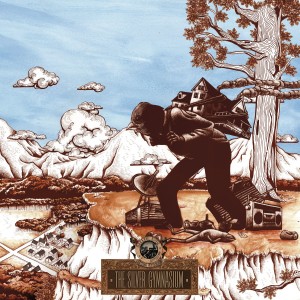Pink-Slips – Okkervil River
Let’s start by saying that The Silver Gymnasium is a very good album. It reverses the decade-long trend of each successive Okkervil River album being slightly worse than the one that came before. And while it still remains a cut below The Stage Names, and therefore stands cleanly on the far side of the banks from their trio of early-career masterpieces, I would listen to the argument that it’s their best outside of that group.
It’s a record about nostalgia, and the way we are shaped by the places that we grew up. For Sheff, that place was Meriden, NH – and this album explores his complicated relationship with that hometown. It’s a wonderful concept and helps to give this record the lyrical backbone that had gone somewhat missing in their past couple releases.
It also provides the musical backbone, with results that are somewhat harder to parse. For a record about the 80s, it makes perfect sense that a lot of the big musical brushstrokes of that era would feature prominently. And that’s not a problem per se. In the same way that people often get Springsteen wrong by thinking that the bombastic style somehow erodes the authenticity of the message, it would be a mistake to write this record off. The power pop stylings that drive the record, and the smoothly polished sheen that accompanies them, are clearly being employed with a subversive twist.
By subversive, I don’t mean that it’s supposed to be a critique. This is not an ironic overidentification with the John Cougar Mellencamps of the world, but instead is a kind of nostalgic affiliation – which is also distinct from a full-throated endorsement. When it works, it manages to be both a gentle satire on the genre while also still itself being a part of that genre (think: The Princess Bride or Futurama, which satirize because they love). And, after all, this album is ultimately about nothing other than the strange allegiance we sometimes feel between our present self and a past that we would not wish to re-live yet still feel a powerful nostalgia for.
We hear this stated most explicitly on the wonderful “Pink Slips,” where Sheff expresses his complicated feelings for places that were ultimately defined by sadness. It’s a strange feature of the human animal that we often feel a loving connection to the places that birthed us, the references that shaped us, and the things that we have now outgrown.
At its best, this is simply a record about moments, about memory, and about the poetry of imperfect understanding. “Black Nemo” conveys all of these with a sort of gentle urgency that is sneaks into your consciousness. The lyrics are so densely constructed that it took me many listens to begin unpacking them. And even after hearing them dozens of times, I’m not really much closer to constructing a story for them. Instead: they speak to me about the intense particularity of our own experiences, the pieces of our past that we feel but could never manage to truly explain.
There is a gesture toward the fantastical imagination of youth, toward the idea that the utterly mundane experience of growing up, somehow, for each of us manages to feel special. Because, weirdly, it is. The beaches we walked down, the songs we listened to, the long drives with our parents, these seemingly unspecific and meaningless events all still managed to build an entire world, a human consciousness, a completely unique and individuated identity. They constructed the eyes through which we see the universe, and therefore in a strange way, built an entire universe.


This took me way too long to get to, but excellent review, Charles! This is beautifully done:
The beaches we walked down, the songs we listened to, the long drives with our parents, these seemingly unspecific and meaningless events all still managed to build an entire world, a human consciousness, a completely unique and individuated identity. They constructed the eyes through which we see the universe, and therefore in a strange way, built an entire universe.